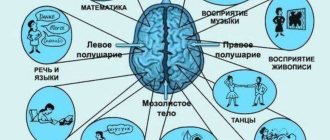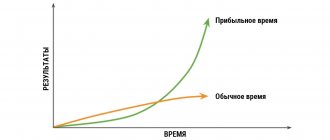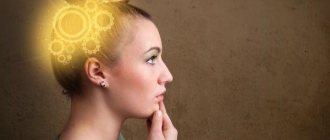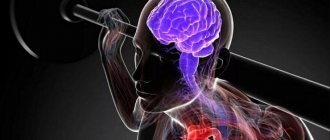The last century marked a major leap in human development. Having gone through a difficult path from the primer to the Internet, people have not been able to solve the main mystery that has tormented the minds of the greats for hundreds of years, namely, how does the human brain work and what is it capable of?
To this day, this organ remains the most poorly studied, but it was this organ that made man what he is now - the highest stage of evolution. The brain, continuing to keep its secrets and mysteries, continues to determine the activity and consciousness of a person at every stage of his life. No modern scientist has yet been able to unravel all the possibilities of which he is capable. That is why a large number of myths and unsubstantiated hypotheses are concentrated around one of the most important organs of our body. This can only indicate that the hidden potential of the human brain has yet to be explored, but for now its abilities go beyond the boundaries of already established ideas about its work.
Photo: Pixabay/geralt
How to develop brain abilities?
It has long been proven that a person himself is capable of developing the capabilities of his brain. This can be done with the help of books, special computer programs, and interesting exercises. All of the above helps in accumulating useful information, improving memory, and concentration. At the same time, to develop thinking, we need to periodically solve complex problems, solve riddles, and train our brain activity.
It is recommended to train your brain's abilities by engaging in new activities. At the same time, it is desirable to reinforce the acquired knowledge with practical experience.
There are many theories that the human consciousness is capable of many things. Moreover, this “much” often goes beyond the boundaries of physics. Some people are confident that they can train their brain in such a way as to be able to hold their breath for several hours, independently heal from serious illnesses, slow down their heartbeat, have telekinesis and other supernatural abilities. Now all this seems impossible, because it goes against science.
Eastern sages have been studying the possibilities of developing the hidden abilities of the human brain for many centuries. They noted that even small progress in this matter would require:
- Patience.
- Persistence.
- Good teacher.
- A lot of time.
Probably, many people, at least once in their lives, have noticed a small surge in brain activity, which could manifest itself in fantastic intuition at critical moments.
Psychologist K. Jung said that our consciousness is the tip of the iceberg, and the larger part, the unconscious, is the part of the iceberg that is hidden under water. At the same time, the depth of the iceberg is unknown, so the possibilities of human mental activity are considered to be unlimited. It is this depth that is the hidden abilities of the human brain, the study of which is incredibly difficult.
A huge amount of work in the field of studying the human brain was carried out by V.M. Bekhterev (at one time) and V.S. Savelyev (if we talk about our contemporaries). In their research, these scientists, like many other foreign colleagues, came to the conclusion that it is extremely important to develop the abilities of one’s consciousness and thinking throughout one’s life. At the same time, it is very difficult to say what a person will be like who can use all the capabilities of his brain.
The size of the brain does not in any way affect the intelligence and quality of mental activity of a particular person.
It is important to understand that developing abilities is not only about reading books, solving problems and performing other thought processes. First of all, you need to find a way to lay a high-quality foundation on which you can build new knowledge and opportunities to develop your intellect. Scientists make the following recommendations on this topic:
- Getting rid of physical inactivity. Physical inactivity is a dysfunction of various systems of the human body as a result of low physical activity. It is because of a sedentary lifestyle that hypoxia of brain structures occurs (lack of oxygen). In this state, our brain is not able to develop. With a serious lack of oxygen, brain structures begin to degrade.
- Providing the body with sufficient amounts of phosphates and carbohydrates. In the absence of a deficiency of phosphates and carbohydrates, the human brain is fully ready to learn new things and develop abilities.
- Systematic exercise, communication with other people.
- Normalization of the diet, providing the body with a sufficient amount of all necessary vitamins and microelements.
- Avoiding stressful situations, normalizing sleep.
- Complete physical and mental rest when the need arises (the optimal solution is to master relaxation techniques).
Considering the characteristics of the human brain, a variety of factors can influence its abilities and capabilities: poor nutrition, unfavorable environmental conditions, stressful conditions, chronic diseases and much more. Therefore, it is important to create a favorable environment for yourself in which you will be comfortable not only morally, but also physically.
Many scientists are convinced that the human brain hides its real capabilities, demonstrating them only in those moments when it is really necessary.
The most common myths about the human biological computer
Neuronal tissues of the brain die during the life of the body, and new ones are not formed. This is a fallacy that Elizabeth Goode has proven absurd. Nervous tissue and neurons are constantly renewed, and new connections replace the dead ones. Research has confirmed that in areas of cells destroyed by stroke, the human body is able to “grow” new material.
The human brain is only 5-10% open, all other possibilities are not used. Some scientists explained this by saying that nature, having created such a complex and developed mechanism, came up with a protective system for it, protecting the organ from excessive stress. This is wrong. It is reliably known that the brain is 100% involved during any human activity; it’s just that at the moment of performing any actions, its individual parts react one by one.
Thinking
The capabilities of the human brain are inextricably linked with various aspects of its activity, one of the most important of which is thinking. The thought process is a non-stop search for the most suitable solution to the problems that have been set before a person. When we need to make even the simplest and most insignificant decision, our brain processes several options at once, analyzing the potential, characteristics and usefulness of each of them. In other words, all people literally every second build a tree of possibilities in their heads with a huge number of branches. The correct use of these branches is the most important thing in the thought process.
But what does our mind do when we need to choose the best option with a missing search algorithm? In this case, heuristics come to the rescue. Heuristics is a scientific field that studies the specifics of creative activity. With its help, the human intellect uses various methods and techniques that help solve all sorts of practical, constructive, cognitive problems through creative thinking, philosophical and psychological techniques.
For left-handers, the right hemisphere works more, and for right-handers, the left hemisphere works more. In this case, one of the hemispheres can seriously dominate the other. For example, not only the left hand is more developed, but also the left ear and left eye.
Almost all brain structures are involved in the thought process: the telencephalon, midbrain, medulla oblongata, cerebellum and other systems. It is unknown when scientists will be able to reveal all the secrets of the human brain. The fact remains: this clearly cannot be expected from humanity in the coming centuries. The human brain and its capabilities are clearly depicted in the diagrams and illustrations of psychologist Jung, who spent his life studying cognitive abilities and the thought process. If you are interested, it is recommended that you familiarize yourself with the works of this scientist.
Cognitive technologies
Cognitive technologies reflect the processes of human cognitive activity. The principle of the human brain is used in artificial intelligence systems. An example is video cameras that are installed along the highway to monitor the faces of car drivers. Artificial intelligence systems are able to determine in a split second that the driver looks tired and is about to fall asleep.
Such innovations are designed to reduce the number of accidents on the roads, which in most cases occur due to the fact that a tired driver has lost vigilance and the ability to concentrate. Another example of cognitive technology is compact video cameras that are mounted on the shoulder of visually impaired people.
The system scans the surrounding space, determines street names and house numbers, voicing information to the owner, which allows a blind person to navigate the city streets without an accompanying person. The cognition of machines and electronic devices is associated with the characteristics of the human brain.
Artificial intelligence systems are capable of perceiving information, processing and analyzing data, drawing logical conclusions, and self-learning. Cognitive technologies are the most important achievements of our time. Cognitive science combines knowledge from different fields - philosophy, psychology, neurophysiology. The picture of reality within the framework of cognitive science is presented in the form of measurements:
- Objective universe.
- Subjective image within the objective world.
- Interaction between reality and representation (secondary subjective representation of reality).
The relationship between actual reality and ideas about it reflect the adaptive abilities of the individual. In terms of adaptation to environmental conditions, the degree of its adequacy is of great importance. Cognitive science is the body of knowledge and technology used to enhance the capabilities of our brains.
A distinctive feature of technology is its social and practical benefits. An example of the use of cognitive technologies is the formation of virtual reality in the process of professional training of drivers, pilots, astronauts, and dispatchers.
Knowledge representation
Representation of knowledge is one of the components of our thinking. A person views the world around him through the prism of perception, thereby forming in his head his own schemes of observed objects and processes. Therefore, during the thought process, people use pre-constructed models rather than real objective data.
A typical example is the joke about a glass, when an optimist is sure that it is half full, and a pessimist is sure that it is half empty. At the same time, there may be many more ideas of knowledge regarding a glass of water. For example, a programmer may say that the glass is 2 times larger than required. As a result, we have the same initial information, but different models used by different people. A glass filled with water acts here as a problem, the solution of which is to explain the object. And there can be many explanations (solutions) here.
That is why thinking must be combined with learning, accumulation of information and further generalization of all data. At the same time, you should not expect phenomenal results - you can improve your thinking, but it is unlikely that you will be able to unlock your hidden potential.
The development of the thought process occurs throughout life in all mammals. This is especially pronounced in monkeys, dolphins and other animals that are capable of pronounced mental activity. Of course, you cannot teach them to read, but giving them the opportunity to develop new thoughts and solutions is quite possible.
A person’s ability to learn new languages is practically unlimited. In theory, you can learn 20-30 new languages by speaking them at a native level. At the moment, there are only a few such polyglots in the world.
The brain can learn through imagination
Creativity is not for everyone.
A simple experiment first performed more than 100 years ago. People were divided into two groups. One group was taught basic piano skills using the instrument. The other group was taught without a piano. People were simply told how to place and move their fingers correctly, and also described how a particular note sounds. By the end of the training, it was determined that both groups had the same skills - both were able to play the tune they were taught on the piano.
In the 1990s, using more modern scientific tools, scientists actually discovered that imaginary learning and practice can have the same effects on the brain as real ones.
Types of thinking
The abilities of the human brain and the perception of the surrounding world only partly depend on the age factor. In childhood, the level of development of the thought process is extremely simple: “I saw - I did an action.” As people grow older, they develop a visual-figurative form of thinking: “saw - analyzed similar situations / worked through options for action / assessed risks - took an action.”
Next, objects gradually change into categories and representations, and connections between them are formed. As a result, a person develops a verbal-logical abstract type of thinking, when in order to start the thought process there is no need to perform certain actions - they are all performed in the head.
In the 20th century, the famous scientist in the field of psychology W. Keller conducted an experiment on monkeys. He locked several monkeys in a cage, gave them a stick, and threw a banana nearby. Many monkeys quickly figured out that they needed to take a stick and push the banana with it. In this case, the animals used a visually effective thought process: the monkeys carried out the experiment using a stick, quickly discovering the correct solution to the problem.
The human brain is an extremely energy-consuming organ. It has long been proven that in the process of work it burns approximately 1/5 of all calories available in the human body.
After this, V. Keller complicated the task: the next banana was moved further away from the cage, and the animals were given two sticks of different lengths. For the monkeys, solving the second problem became impossible. They couldn't understand why they couldn't use the first stick to move the banana towards the cage without trying to grab the second stick. Only a small percentage of the many monkeys that took part in the experiment sat down and thought, eventually finding a solution to the problem. Instead of beating the cage with a stick, going wild, and feeling emotional, as was the case with most monkeys, the smartest animals thought and imagined the action in their imagination.
The same thing happens with people. Our brain forms a universal type of thinking: if the first algorithm developed by the intellect is not suitable for solving a problem, the consciousness begins to search for a new idea and connections until it finds the optimal option.
Emotions are the most important component of universal thinking. With the help of psycho-emotional activity of the brain, we can model the goal and modify it. Therefore, you need to try not to suppress your emotions, but you shouldn’t express them too violently. Everything must be in balance: mental activity, expression of emotions, and consumer qualities. If something is suppressed, then disturbances in the functioning of individual systems of the human body will certainly occur, which will affect the functioning of the brain and other internal organs.
If you move your eyes quickly, the human brain will not be able to adequately process the information received. The same can be said about auditory perception.
Superpowers. What can surprise the human mind?
Some people who do not outwardly show signs of having incredible abilities may have truly incredible abilities. They don’t appear in everyone, but scientists say that regular intensive brain training can develop superpowers. Although the secret of “selecting” people who may have the right to be called a genius has not yet been revealed. Some people know how to competently get out of difficult situations, while others sense approaching danger on a subconscious level. But the following superpowers are more interesting from a scientific point of view:
- The ability to perform mathematical operations of any complexity without the help of a calculator or calculations on paper;
- The ability to create brilliant creations;
- Photographic memory;
- Speed reading;
- Psychic abilities.
The invisible capabilities of the human brain
Many of the capabilities of the human brain are hidden and unnoticeable. At the same time, the brain performs a huge number of functions, and we don’t even notice it. Let us highlight the most important and noteworthy of them:
- "Autopilot". The brain completely regulates the activity of the body as a whole, individual systems, organs and cells. It monitors the functioning of all functions that are required to maintain normal life: respiratory process, cardiovascular system, sleep, digestion, etc. A newborn baby immediately has all the “autopilot” functions, despite the low level of brain development. A person does not need to think about the processes of digestion, breathing, sleep and many others - everything happens automatically.
- “Everything works by itself.” Regardless of the potential of the human brain, it will in any case control the functioning of the respiratory system, gastrointestinal tract, maintain heart rate and the functions of other systems - for all this we do not need to involve the thought process. In order for everything to happen naturally in the human body, neural networks controlled by the hypothalamus are connected. The autonomic nervous system is responsible for all this, which every millisecond, through nerve connections, contacts every part of the human body.
- Sleep rhythms. Something similar to an internal clock works in our brain (this process has not been fully studied by modern science), which receives information from the eyes about the level of ambient light, about the body’s fatigue and tiredness, as well as many other data. The human internal clock allows our body to ensure optimal functioning during the day and its full recovery at night during sleep. It is the internal clock that is responsible for regulating sleep rhythms - they transmit information to different systems of the body that it is time for a person to sleep. As a result, there is a significant decrease in the activity of the brain and internal organs.
- Increased body temperature. Not everyone knows that an increase in body temperature is a protective reaction of our body and nothing more. If the body's cells detect the spread of a virus or infection, then information about this is immediately transmitted to the hypothalamus, which is responsible for increasing body temperature. This complicates the spread of pathogenic microorganisms and stimulates the production and activity of white blood cells.
The human brain develops most actively between the ages of two and ten years. Subsequently, the activity of building neural connections slows down significantly.
Among the capabilities of the human brain, we can highlight those that work faster than our thought process. It's about reflexes. Certain brain structures are also responsible for them, but they are completely autonomous and practically not connected with the work of the left or right hemisphere, with the cerebellum, hypothalamus or other parts, which in itself is incredible.
Scientists describe reflexes as a special system that allows you to instantly, without the participation of the left or right hemisphere, react to specific threats to human health and life. For example, if our hand touches something hot, we will immediately pull it back, without even having time to think about the burn or any other consequences.
Our brain can predict the future
Agility.
It has been found that there is a delay when visual information enters our brain, allowing us to predict what is going to happen next. These predictions are based, among other things, on our past experience (a ball is flying at us - we need to dodge; an open road hatch - we need to go around). We don't even connect our consciousness to it (in other words, we don't think about it). All people are able to predict the future, which helps us avoid those things that can harm us.
Unique properties of the human brain
Intensive brain formation occurs at a young age, from 2 to 11 years. To fully utilize the capabilities of the human brain, new, strong neural connections are required. There are no strong connections in the children's brain yet. Their formation occurs during learning, cognition and acquaintance with the world. A typical method of memorization for this age is the use of eidetic memory, thanks to which children more easily learn a lot of new material. In adults this ability is extremely rare.
The unique characteristics of the human brain are supported by facts:
1. The organ works without breaks, without days off, even during sleep its high activity is observed.
2. The organ does not get tired from work - research has proven it. The blood of an intellectually busy person remains unchanged at the end of the working day.
3. The brain reacts the same to thoughts, whether they are inspired by fantasy or imagination.
4. The brain can store some situations for a long time and others for a short time.
5. Most of the processes are controlled by the subconscious. The subconscious is activated in order to avoid overload, bypassing consciousness.
6. The speed of thought outstrips the speed of light, which muscles cannot keep up with. Bad handwriting is proof of this.
7. The brain wakes up a little later than the body. A person who has just woken up needs exercise (physical) and for the mind.
8. Thanks to mental exercises, the volume of neurons increases and their connections improve. These exercises slow down aging and prevent Alzheimer's disease.
9. Thoughts that often appear turn into reality. Therefore, if you want to change something, you should change your own thinking.
10. Compensation is the ability of an organ to use, for example, the part that is injured.
11. Relieve brain tension through prayer or meditation.
Scientists have discovered the brain's ability to change physically. Such manipulations take place over a long period of time. Transformation depends on attitudes, on what a person thinks.
The human brain has incredible potential that has not yet been explored. For a long time it was believed that neurons do not renew themselves, but only die. The opinion changed after the discovery made by Elizabeth Good. She found that neurons can grow and also renew themselves at any time in life.
Conclusion. Training your mind can unlock a new secret of opportunity.
Should we develop mental abilities?
Is it possible for any person to unleash the abilities of the mind, for example, to solve complex problems? You can learn a lot if you apply effort and consistency in training.
Study even after graduating from school or college? I unlearned it and that’s it. But no. The brain requires constant work, otherwise it degrades. By the way, only 0.3% of the total population are some kind of genius people. The vast majority of humanity is engaged in routine and they are happy with their situation. The main thing is that a person should feel comfortable.
Kim Peek and Solomon Shereshevsky
Solomon Shereshevsky came under the supervision of psychologist A. Lurie when he was quite a young man - and his memory was phenomenal without any training. His way of “saving” information is similar to the mnemonics techniques known today. It seemed that the volume of his memory was not limited by anything. His only problem was learning to forget.
This man had so-called synesthesia. In all other respects, S.V. Shereshevsky remained quite ordinary. The situation is not the same with Kim Pik - he was born with certain disorders, which, however, in themselves should not have made him either a genius or a patient. However, already at 16 months the child learned to read, by the age of three he had mastered newspapers, and by the age of seven he had memorized the Bible. The books of Daniel Tammet (who, like Kim Peake, is a “savant”, but is much more social and, unlike others, can explain exactly how he makes calculations) do a good job of describing the capabilities of the human brain.
Kim Peak kept in his head maps of American cities, hundreds of pieces of classical music, and remembered several thousand books he had read. All this was not just “dead weight” - he understood the information in his memory, could interpret and use it.
In 2002, he began playing the piano, scoring many pieces from memory. It was he who inspired Barry Levinson to make the famous film Rain Man.
Content:
- 1 To the brain, fantasy and reality are the same
- 2 Human memory can only hold 7 different objects in mind
- 3 Yellow-green is the most sensitive shade for the brain
- 4 The subconscious mind is an order of magnitude smarter than you
- 5 The brain works continuously
- 6 Work that uses intelligence does not tire the brain
- 7 Meditation and prayer have a relaxing effect on the brain
- 8 The brain is often so fast that muscle mechanics can’t keep up.
- 9 The brain does not wake up immediately and later than the body
- 10 For brain activity to be complete, there should be no lack of fluid
- 11 For the brain, any shadow is a continuation of the object
- 12 The brain is trained, like all muscles
- 13 What we keep in mind is what we tune in to
- 14 It’s much easier for the brain to “digest” a male voice
- 15 We Are Quite Capable of Changing Our Brains
The human brain is in fact the most mysterious system of cognition of the world with creative and amazing abilities.
The brain has many abilities that we are sometimes not even aware of. Well, in order to take advantage of them and fulfill your cherished dream, it is important to understand the fundamental principles of brain functioning.
Are superpowers dangerous?
— There is a common idea that the brain has some superpowers hidden in the subconscious. Is this really true?
— The role of the ideal in the functioning of the brain should not be overestimated. This is where myths arise about his superpowers and hidden reserves - they say that a person in ordinary life supposedly uses only a small fraction of what is actually under his control. Who, for example, has not heard the story about a passerby who, fleeing from a dog, climbed over a three-meter wall, although he had never before or since been able to climb even over a two-meter one... There are plenty of variations on this theme. The finale usually concludes that each of us has a lot of unrealized potential, and if we could learn to use them... Well, it’s not difficult. Give yourself a dose of doping and go for it. Most likely, you will die on the second try...
Such ideas are similar to the myth of the conquest of nature. Yes, the body has reserves. But they are reserves because they are reserved for rare, truly extreme cases. A person can do a lot, but not everything - at the same time, one has to pay for achievements, sometimes too high a price...
Article on the topic
Living supercomputer. Why does the brain need water and why is it more active at night? For example, there is a theory that real muscle strength is many times greater than what we show in competitions. The situation is the same as with ultra-modern, super-powerful cars, in which the speed is artificially limited. Limitations on muscle strength occur due to fragility of bones and insufficient strength of tendons. Why are there endless stories about jumping and incredible strength? Yes, because at the moment of danger a huge dose of adrenaline is released in the body. The body is cleverly designed. He understands that when, say, a tiger attacks, it is not the time to think about the correct distribution of energy, and sprained ligaments can be repaired later. But when the untapped capabilities of the brain are discussed (supermemory, superfast counting and other phenomena), boring ideas about natural barriers are immediately forgotten.
The whole question here is the price of superpowers. It is known that almost all Olympic champions are sick people. Their records are associated with the exorbitant mobilization of the body’s forces: this does not go in vain. The price for a medal at 18 is often disability at 40. A person works hard without thinking about the future. Or, let's say, there are people who never sleep: oddly enough, they are not allowed to drive a car. They compensate for the lack of normal sleep by falling asleep for a second or two. And in a second, by the way, a car can travel tens of meters...
By the way, superpowers in themselves are not always a good thing. Let's take, for example, the same memory. Storing huge amounts of information in your head instantly and forever is amazing. But the ability to forget is also a great thing. Imagine that one of the spouses remembers all the family scandals, psychological traumas, and defeats. It's hard to live with such a memory. The great detective Sherlock Holmes avoided unnecessary knowledge. Everyone who works on a computer faces a similar problem: a 500 gig disk can be filled very quickly, but how can you then find the file you need? Those who remember everything often have little use: they are overwhelmed with information.
Charging for the head. What exercises will help pump up your brain? More details
So far, most cases of extraordinary human ability have led to losses in the future or even the present. Almost any deviation from the stability of the human body does not lead to good. Hence the conclusion follows: superpowers, in theory, should be prohibited at the biological level - by the desire of the brain and the body itself for balance. Therefore, the brain introduces quite strict restrictions into our thinking, just as it is impossible to play a fast melody in the bass register.
Superpowers are dangerous for their owner. Let's take the life and death of Vladimir Vysotsky, who undoubtedly had superpowers, but they “burned” (literally, if we talk about energy) his body. Or, say, the fate of Pushkin, Lermontov... If the price for developing one’s abilities and skills within normal limits is training and a healthy lifestyle, then the price of superpowers is the hypertrophy of one quality at the expense of others and, possibly, premature death.
Article on the topic
Super Elder.
What miracles did Grigory Rasputin perform? — If the brain is not fully studied, then it is impossible to deny it some kind of paranormal abilities?
“I think the time will come to study phenomena that are now considered non-existent: the phenomenon of precognition, the exit of the soul from the body, the possibilities of telepathy, prophetic dreams. For example, telepathy: is it there or not? One thing is clear: the transmission of thoughts over a distance would make the existence of highly developed life forms impossible. And the so-called exit of the soul from the body occurs only in critical conditions, for example, when a person is dying. Why? When life fades, the coordinated work of various systems is disrupted. They are barely enough for self-sufficiency, but no longer for interaction. And then, perhaps, some prohibitions and restrictions cease to operate in the brain... For some people these are innate qualities (in this case we are talking about talent or even genius). They can manifest themselves, for example, when setting a super task in the form of insights and are accompanied by a change in the internal time regime.
— So time flows differently in the brain?
- Perhaps so. In particularly complex structures, energy can transfer into time or space and vice versa. In other words, it is possible that the brain in its volume is capable of changing the laws of space-time. Theoretically, one can imagine how a complex neural network (a set of billions of neurons) locally, in the volume of the head, modifies the properties of space depending on its structure and state.
Article on the topic
Breakthrough or profanation: how will a Russian programmer have his head transplanted?
The role of pro- and prebiotics in the body
The main function of the intestines is to protect the body, which is impossible without good bacteria. This organ protects a person from poisoning, infections and eating disorders. Each organism has an individual intestinal microclimate - a community of bacteria that interact with each other and control everything that gets inside.
If harmful bacteria or other irritants enter the intestines, prebiotics and probiotics eliminate them, improving internal processes.
They supply the body with energy, biologically active substances, vitamins, regulate the digestion process and produce vitamin K, necessary for blood clotting. Due to stress, serious illness or treatment with antibiotics, bad bacteria penetrate the intestines and multiply, fighting the microflora. As a result of this struggle, there are fewer good bacteria, which affects your condition: the stomach begins to growl, flatulence appears, the digestion process is disrupted, which leads to nausea, diarrhea, or, conversely, constipation.
This greatly affects your immunity: it weakens and cannot fully protect against viruses coming from the outside, so you get sick more often.
↑ Yellow-green is the most sensitive shade for the brain
This shade is often called chartreuse (funny that it's named after a liqueur).
The eye receptors, as is known, perceive only red, blue and green. Moreover, the brain is designed in such a way that it does not receive anything directly about color, but only information about the various gradations of dark and light, plus data about the very difference between the colors available to it. Chartreuse is located in the table of frequencies of the spectrum accessible to visual perception approximately in the center. Because of this, it is easier for brain receptors to recognize exactly this shade. This amazing ability has not gone unnoticed by artists, magicians, and psychologists, and is often used in their practices as the most noticeable and relaxing color.










